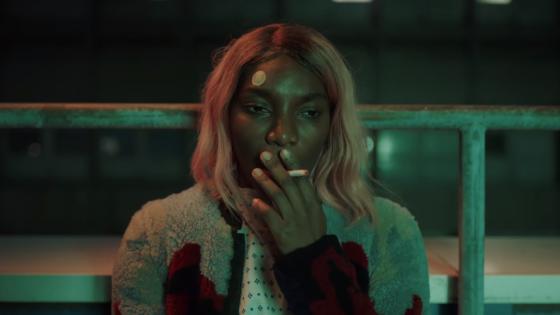

Explaining her career path, she tells another writer, “Everyone on Twitter was, like, ‘You should make a book.’ ” For Arabella-the author of the self-published “Chronicles of a Fed-Up Millennial,” drawn from her viral tweets-writing is either something to avoid or an act of improvisational bombast. Arabella, who has been quipping and alert, suddenly shrinks and crumbles, hiding her face in her sweater.Īrabella’s philosophy of art is distinct from that of her creator. “Who is he looking at?” one of the policewomen asks. Soon after her night at Ego Death Bar, Arabella, realizing what must have happened, calls Terry: “Yo, T., I just got spiked, you know.” At the police station, she describes to two kindly female officers the image that has been replaying in her mind. As ever, in Coel’s hands, cheer can turn to darkness in an instant. She lives precariously, attracting bemused protectors as she staggers out of the night club, the moralizing drug dealer Biagio (Marouane Zotti) follows her home, picking up the house keys that she drops, and later becomes her on-off boyfriend. At a trashy night club in Ostia, Italy, where Arabella sojourns with Terry on the publishing agency’s dime, she gets high on “ket” and coke and upstages the go-go dancers.

A wreck of charisma, Arabella dodges inquiries about the status of her book, willing her white agents into shell-shocked submission. Arabella carries with her a trippy ikat-print bomber jacket like a comfort blanket, and loves her pink ombré wig like someone who’s been told that she alone can get away with wearing such a flashy thing.Įssiedu and Opia are understated and frequently superb, while Coel channels her enormous energy into a standout performance. Combat boots are scuffed there’s not a lot of money, but everyone wants to be seen, flirted with, consumed.

The world of these characters, who have scrambled together their own avant-garde, feels lived-in. Arabella has improvised a family in her mates Kwame (Paapa Essiedu), a gay aerobics instructor with a Grindr addiction, and Terry (Weruche Opia), an aspiring actress.

#I may destroy you stealthing scene series#
Coel and Sam Miller direct the series with an unaffected intimacy-we hardly notice how many shots of Arabella feature her sitting on the toilet, her panties hugging her calves. In 2018, Coel revealed that she had been drugged and assaulted while working on Season 2 of “Chewing Gum.” Arabella, like Coel until a few years ago, lives in a cluttered East London flat with a gentle white male roommate, Ben (Stephen Wight), who supports her like a piece of old furniture. Like “Chewing Gum,” which drew on an early-adult dalliance Coel had with Christianity, “I May Destroy You” is a semi-fictional portrait of the artist and her social world. This black woman cannot live, or create, in the margins. Coel treats sex as slapstick and desire as an embarrassment, and finds a freedom in abjection. Coel is an astonishingly inventive physical performer a cerebral clown, she brings to mind, in her wiriness, and her willingness to contort her angular face, both Lucille Ball and Kim Wayans. Tracey’s entrance into womanhood is a cringe comedy: dressed in nauseating tribal costume, she dances for a white paramour, the seduction a hilarious failure of grunts and flailing limbs. In 2015, she made “Chewing Gum,” a joyful series adapted from a one-woman play she wrote while in acting school, in which she portrayed Tracey Gordon, an awkward virgin fanatically attempting to shed her chastity. A prodigiously talented writer, director, showrunner, and actor, she has an anthropological interest in all kinds of physical congress, in what happens when one body encounters another. Many of us have been there.Ĭoel, who is thirty-two, was born to Ghanaian parents and grew up in East London public housing with her mother and sister. It will be a while before she can acknowledge that the image is a memory. Somehow, she meets her deadline, but the next day a reel of horrible action colonizes her brain: a man, sweating and panting, thrusting in a bathroom stall. Is the scene comedic? Then a temporal blackness: Arabella bolts awake at her writing desk, a gash on her forehead. Arabella dizzily claws her way to the door. At some point, the bar begins to disintegrate and blur. A late-night crew parties and shares a round of shots. She and an acquaintance drift to a place called Ego Death Bar. In the pilot of “I May Destroy You,” a mesmerizing twelve-episode series for HBO and BBC One, written and co-directed by the aggressively free-minded Michaela Coel, Arabella (Coel), a young East London writer who owes her book agents a draft, abandons her laptop and slips into the night-just for an hour. Who hasn’t been there? A deadline looms, but inspiration won’t come.


 0 kommentar(er)
0 kommentar(er)
